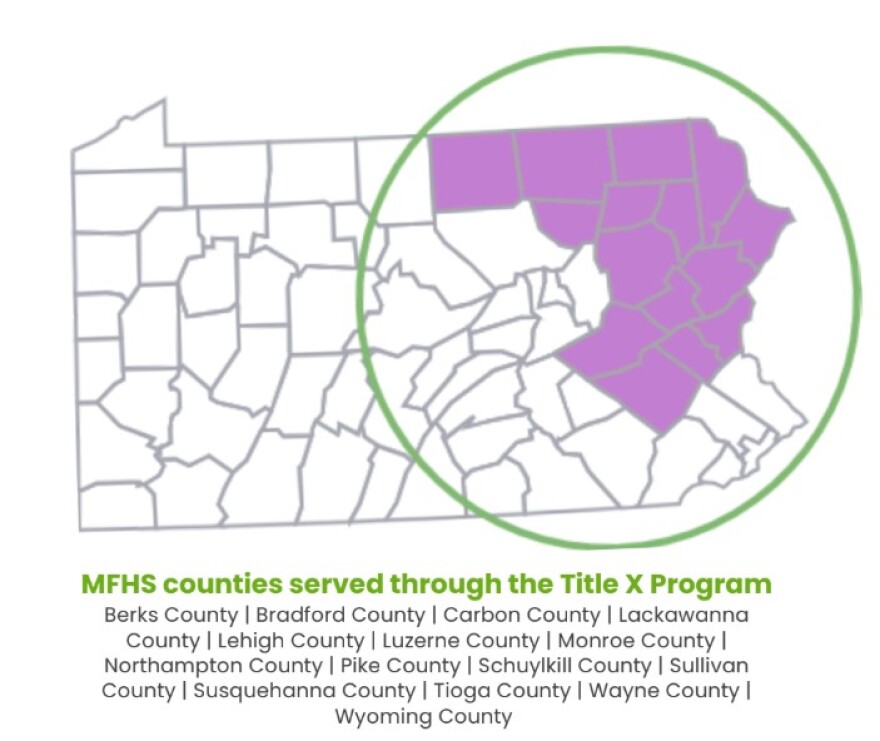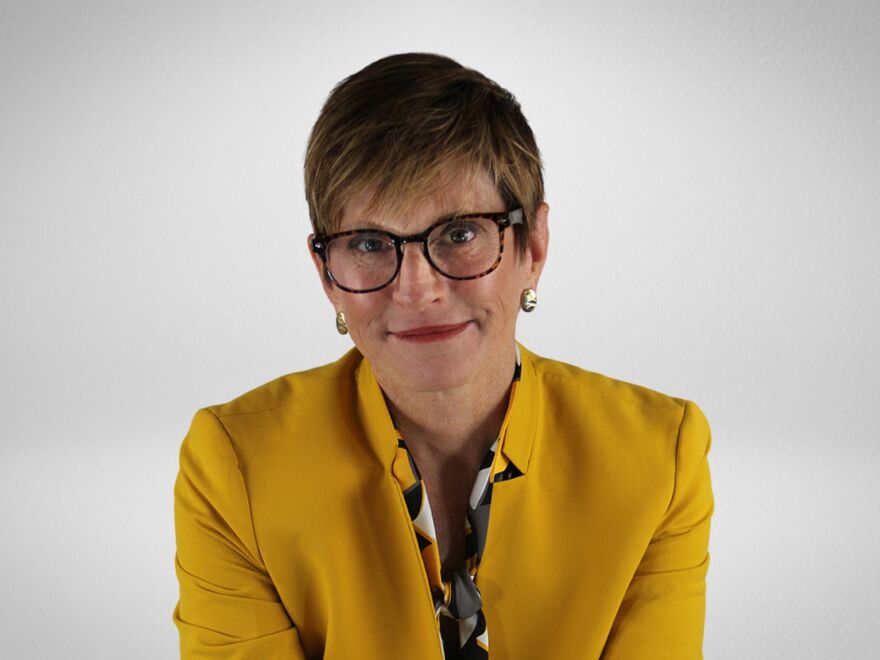Northeast Pennsylvania-based Maternal and Family Health Services (MFHS) provides health and nutrition services to women, children, families and other agencies across a large swath of Pennsylvania, but some of those services could be in jeopardy.
Trump administration scrutiny of the federal Title X program, which funds family planning services, means MFHS and similar organizations already are receiving substantially less money to continue providing those services, and future funding is in doubt.
“With that funding, we're able to support a very diverse network of sub recipients that provide the Title X, family planning, reproductive health care services at locations throughout 15 counties in eastern Pennsylvania,” said Shannon Hayward, MFHS’ chief operating officer. “It's not just MFHS, it's our network providers, which include FQHCs [federally qualified health centers] and hospital systems and standalone clinics.
The U.S. Department of Health and Human Services has put Title X grants on pause for some organizations while they conduct a compliance review of the program.
That means some Title X recipients are under review, while others, like MFHS, are receiving less money than expected.
“Some Title X grantees received notification that their grants were paused pending a compliance review. Each of the organizations with grants on hold received a detailed letter explaining the reason for the pause in funding and requesting documentation within 10 days to assess compliance with grant terms and conditions,” a spokesperson from the United States Department of Health and Human Services told WVIA in a statement.

Title X under the Trump administration
Title X is a federal program providing reproductive and preventive health services through the U.S. Department of Health and Human Services' Office of Population Affairs. The program's funding includes free and low- cost contraceptive methods, STI testing and treatment, pregnancy tests, cancer screenings and more for low- income and uninsured Americans.
The Trump Administration announced in March a temporary freeze on funding pending the compliance review, with remaining grantees like MFHS receiving only a portion of their expected grant.
President Donald Trump’s budget proposes wiping out the program entirely.
“The budget consolidates a variety of programs that were formerly part of HRSA [Health Resources and Services Administration], including… family planning programs (- $286 million), which use taxpayers funds to nonprofits that are not aligned with several administration policies,” the budget reads.

Title X recipients have been through this before. Planned Parenthood withdrew from the grant program in 2019 instead of complying with a Trump administration rule regarding abortion counseling. The Biden administration worked to rebuild the Planned Parenthood Title X network.

“Planned Parenthood Keystone has relied on Title X to help support its delivery of care to patients who are uninsured or underinsured and those most vulnerable populations for decades,” said president and CEO of Planned Parenthood Keystone, Melissa Reed. “We lost Title X during the first Trump administration. During the second Trump administration, the President has said that he wants to eliminate the program in its entirety.”
Reed said Planned Parenthood providers learned how to work without the program.
“I have full faith that our donors and supporters will stand with us,” she said. “Will help support us. I will lean heavily on our community and funders and the Pennsylvania State legislature to provide the resources we need to continue to deliver this vital care for people.”
MFHS supports network of providers with Title X
MFHS covers 17 counties in Northeast Pennsylvania overall, but its Title X coverage area is 15 counties and more than 17,000 individuals. The organization is one of four Title X recipients in the Commonwealth.
The agency received only 46% of its expected grant. Officials said there’s no indication they’ll receive the full amount, and the $1.6 million grant makes up about 8% of their budget, according to director of development Betsy Ardizoni.
This impacts MFHS’ network of subgrantees that it pays Title X funds to, which as Hayward explained leaves those subrecipients waiting on money they might never receive.

"We were not able to go out with full year contracts for them, because we don't have a full year of funding," Hayward said. "We're in the process now of working with our sub recipients on partial sub awards, and that just creates a lot of uncertainty with the stability of the network.”
They remain hopeful that they will eventually get their full grant, despite limited communication from the federal government.
“We are anticipating and hopeful that by July 1, we may know about another award that would come to us, but we don't have any confirmation,” Hayward said.
Planned Parenthood Keystone is one of MFHS’s subgrantees and covers 37 counties in eastern and central Pennsylvania. It receives Title X funds from two other direct recipients, putting $610,000 on the line because of the freeze and partial awards. Its Wilkes-Barre clinic participates in Title X funding, according to analysis from KFF Health News.
“Our budget is around $12 million so, it's not a significant portion, but it is vital to covering the cost of care for those patients,” Reed said. “For many of our patients, Title X is the difference between getting timely care or going without. It's really a lifeline for those who are uninsured or underinsured.”

Operational impacts of losing Title X money
The potential loss of more than half of the Title X grant will impact MFHS’ operations.
“This is infrastructure funding,” MFHS President and CEO Maria Montoro Edwards said. “This is how we pay for nurses and physicians and medications. To lose that much funding will have a significant impact on the network we serve.”
MFHS considers the program successful because of its ability to connect high risk patients to a network of care.

“The Title X funds support what might be someone's first entry into health care, or their only entry into health care,” Montoro Edwards said. “Then we can refer them to other resources. You can come to maternal and Family Health Services or one of our partners for reproductive health. We can help you to find the other care that you may need for primary care or other services as needed. For some individuals who don't have insurance or don't have the resources, the cancer screenings, the pap smears, the information, the availability of contraceptives at free or low cost is really transformational.”
Montoro Edwards said Title X saves taxpayer dollars by helping MFHS prevent unplanned pregnancies.
“Individuals may then be able to stay in the workforce or plan for when it's the appropriate time for when they are ready to start a family,” Montoro Edwards said.
Planned Parenthood Keystone patients might see a difference in the cost of care if the provider does not get its Title X money.
“We will not reduce our appointments, we will not reduce access to care, but people may have to pay more out of pocket for the care they receive,” Reed said.
‘Reproductive healthcare is part of your primary care’
Reed sees the threats to the program as a danger to the already vulnerable populations that she serves.
“Losing access to Title X is going to impact underserved communities, those who are most disadvantaged. These are people who are not going to be able to get cancer screenings in a timely fashion, who are not going to have access to contraception or STI testing and treatment, and those will have significant public health outcomes on our community,” she said.
She’s been meeting with state legislators to advocate for strengthening reproductive health funding in this year’s budget.
“I have been having a lot of meetings with our champions in the legislature and the governor's office to try to find a way to provide some backfill to these critical funds,” Reed said. “They're currently in budget negotiations, so fingers crossed that will be successful.”
MFHS hopes the current administration sees the value in Title X programming.
“Reproductive healthcare is part of your primary care, it is part of what you need to stay healthy, and so the loss of those funds will have an impact on individuals' primary care and their personal health,” Montoro Edwards said.










